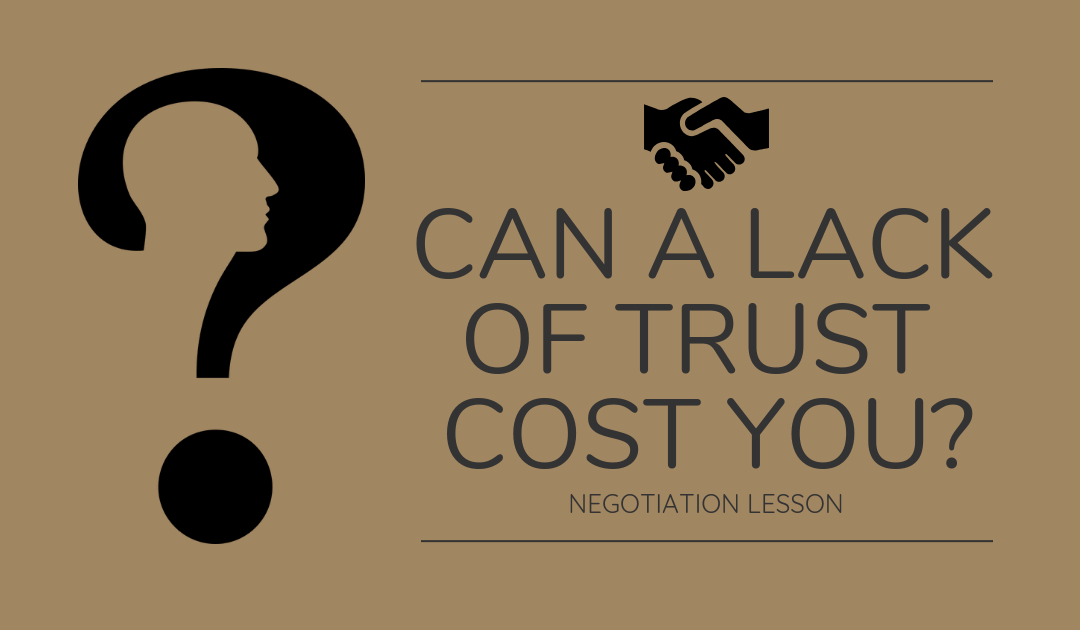“Everyone lies in negotiations. And everyone knows everyone lies in negotiations. So why should we care? Shouldn’t we just assume our counterpart is not telling the truth, should not be trusted, and behave accordingly?”
No. Making these assumptions would be highly counterproductive and inaccurate. Everyone doesn’t lie in negotiations. And we shouldn’t assume our counterparts don’t tell the truth and should not be trusted.
But credibility and trust issues do raise critical problems that infuse many negotiations. And some people do lie and cannot be trusted.
Since these issues permeate many negotiations, we will address it in two columns. We will first focus on why we even care about trust and credibility in negotiations.
In another column, we will address what to do if your counterpart cannot be trusted.
Does a Lack of Trust in Negotiation Change Outcomes?
So why care? Because your and your counterparts’ trust, credibility, honesty, and reputation directly impact your negotiation results.
Studies show the extent that parties mutually trust each other leads to maximum success in many negotiation contexts.
The opposite, too. Parties’ distrust leads to lack of information sharing (a crucial element of negotiation effectiveness), inefficiencies, wasted time, high transaction costs, implementation problems, and lost deals.
Can a Lack of Trust Cost You Business?
Without trust, I will be less willing to work with you to satisfy our mutual and sometimes competing interests. We may not even engage, leaving us with a suboptimal resolution to a problem we both face.
Assume I’m looking for a contractor to build an addition to my house. I get several bids. XYZ’s bid, after our initial negotiation, is the lowest by $10,000. And his references say he does excellent work.
But I also reach out to my LinkedIn and Facebook networks to research his reputation.
One mutual connection tells me XYZ orally promised her certain prices on changes that arose during her renovation. He reneged.
The other emails me XYZ used cheap piping despite promising top quality.
I will likely go with the next lowest contractor. XYZ lost my business. And I paid more for my addition. Lose-lose, due to lack of trust and credibility.

Or let’s say I still go with XYZ. But I end up spending a ton of time detailing the parts used, every possible contingency, and negotiate everything into a contract with airtight provisions relating to a possible breach.
It may still be better than my alternative, given the cost difference and risk involved. But we both lost time and effort having to dot every “i” and cross every “t.”
Trust and credibility also disproportionately and negatively impact negotiations involving parties expecting future relationships.
A colleague recently completed a nine-month negotiation involving a long-term partnership between his company and a serial entrepreneur interested in further funding and managing it. Neither party would have closed had either heard a hint the other party had trust or credibility issues.
“Hold on,” you respond. “This sounds great. But it’s a no-brainer that you want a reputation as trustworthy and credible, right?”
Wrong. Many negotiators put their reputations at risk by playing fast and loose with the truth. Perhaps they make up an alternative to their deal in an effort to create leverage. Or they play games like orally reaching a deal and then nibbling for more. Or they threaten their counterpart in a fit of anger.
Of course, sometimes these strategies work – short-term. And then only if the negotiation involves just a few zero-sum issues (where one dollar more for one necessarily means one dollar less for the other).
But reputation-risking strategies rarely work long-term. Eventually these tactics come to light. Reputations suffer.
Years ago, I raised some money for my software company. I had an investor willing to put in $100,000. But my research turned up a fraud-related problem on his SEC record. I turned down his money. Too risky.
I eventually closed that round – but it took more of my time and effort. He lost out too.
Two final notes. One, it’s not only about getting the best deals. It’s also about behaving morally and ethically. You’ll never regret doing the right thing in a negotiation.
And two, your reputation rests on what your counterpart says about you after the negotiation. Not what you hope they say. Remember this next time you consider a tactic some might find too close to the line.
Latz’s Lesson: Trust, credibility and an honest reputation lead to better and more successful negotiations and deals. Don’t put them at risk.

